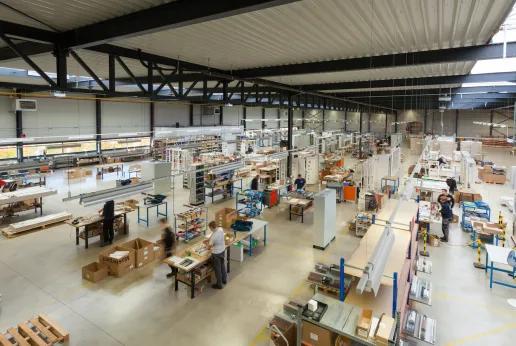
Manufacturing Day 2023
Manufacturing companies continuously strive to optimize production processes. It is, however, not as straightforward to be up-to-date with the numerous trends and new technologies popping up as it used to be. The range of possibilities has never been more extensive and the impact of these technologies on processing time, variety, quality and costs is hard to predict. What can you realistically expect for your specific case or project? What additional expertise is required when rolling out new technologies (such as data analytics, cyber security etc.)?
What can you expect of our Manufacturing Day?
Join us at an inspirational event showcasing several new and innovative technologies. Discover how we can support you in terms of knowledge, hands-on support and infrastructure to realise your production optimisation projects.
During Manufacturing Day 2023, we will present four successful Industry 4.0 cases, zooming in on the real impact and the practicalities involved when optimizing your production:
- How a producer of made-to-measure projects applied digital tools to help operators improve their performance and reduce error rate
- How a producer of customised event materials continuously innovates and digitalizes their production to improve cost-efficiency
Who is this event for?
- CEOs at SMEs
- R&D managers
- Innovation managers
- Head of engineering
- CTOs
- Production managers
Programme
| Time | Topic | |
| 12:00 - 13:00 |
Lunch & Sirris Live Showcase Grab a bite and discover real Industry 4.0 projects during live demonstrations. |
|
| 13:00 - 13:30 |
INTRODUCTION 5 Surprising Truths that Manufacturers Have to Deal with Today Introduction by Ben Van Roose (Agoria) and Bart Verlinden (Sirris) |
|
| 13:30 - 14:30 |
PRESENTING SUCCESSFUL PROJECTS Case 1: How a producer of personalised event materials continuously innovates/digitalises its production to produce cost-effectively By Nathalie Breugelmans managing director at b-token B-token is a producer of personalised tokens and custom applications for the event sector. In addition to focusing on customisation, b-token also deliberately focuses on sustainability, both in its products and production. In order to efficiently produce custom tokens in small series, substantial investments have been made in digitalisation over the past years. Through an online platform, the customer can upload files of the desired products and from that moment on, the next steps from control over work preparation and planning to actual production are fully digital. B-token also invested in innovative digital printing technology to remain competitive. In this presentation, Nathalie Breugelmans focuses on the path the company has taken and the results it have achieved. Case 2: How a custom joinery producer has utilised digital tools to assist operators in their work, thereby reducing the margin for error By Bertrand Schrevens, Managing Director of Kulapro Kulapro provides bespoke joinery for professional clients (B2B). As a small company, it is not straightforward to remain competitive in a sector where each project is almost unique. KULAPRO decided a few years ago to fully commit to digitalisation, not only in production but also (and especially) in all supporting processes. In this presentation, Bertrand Schrevens focuses on how Kulapro, as a small company, has approached such a trajectory and the impact it has realised. There is also a focus on the aspect of change management (i.e. to closely involve the employees), which was indispensable for Kulapro in this trajectory. |
|
| 14:30-15:00 |
KEYNOTE: How Digitalisation Can Enable Growth for the Manufacturing Industry Noël Slangen, Managing Director of POM Limburg |
|
| 15:00-15:30 |
Coffee break & Sirris Live Showcase Take a moment to reset and visit the twelve real Industry 4.0 projects being showcased throughout the afternoon. |
|
| 15:30-16:30 |
PRESENTING SUCCESSFUL PROJECTS Case 3: How an automotive metal processing supplier utilizes AI and machine learning to calculate more accurate process times By Stefaan Kempeneers, COO at Hegge Toelevering and Samuel Franssens, Data Strategist at Python Predictions Hegge Toelevering supplies, among other things, sheet metal to the automotive sector, where strict quality requirements of up to 10 ppm apply. Customer orders are received via EDI (Electronic Data Interchange) and can be adjusted frequently. In addition, small series and prototypes require that planning is precisely coordinated with regular production, virtually ruling out overcapacity. Therefore, companies in a similar situation will derive considerable benefits from dynamic and precise (detailed) planning. Instead of using outdated standard process times, Hegge has developed a Machine Learning-based model to predict accurate process times for each specific production order, taking into account the respective product and material, machine operations, and the involved operator. During this presentation, it will be explained how this dynamic planning method was developed and implemented on the production floor, and what its added value is. Case 4: How a start-up set up a local production for flexible and qualitative manufacturing of food robots By Glenn Mathijssen, CEO at Alberts Alberts, a Belgian food robotics start-up, develops and builds food vending robots designed to make fresh smoothies and soups on demand. Overcoming initial challenges, the company established a local production hub in Belgium, enabling flexible, high-quality manufacturing. Additionally, the vending machines were upgraded with self-diagnose loops to monitor quality and detect anomalies. Advanced robotics integration promises heightened efficiency and accessibility in food production, setting new industry standards. Throughout the presentation, the focus will be on the operational and strategic choices that have allowed Alberts to bring their ideas to life. Glenn will also go over the complexities of setting up localized production for high-quality food robot manufacturing in a competitive global robotics landscape. |
|
| 16:30 - 17:15 |
KEYNOTE: Change - will you give up or will you look for opportunity? Marc Herremans, founder of To Walk Again Foundation. In life, both personally and professionally, we sometimes face significant setbacks. Setbacks and/or lesser days are a part of life for all of us. The art in life is to reframe setbacks and see them as an opportunity to fight back and push boundaries. Marc Herremans demonstrates in this keynote how you can turn an obstacle into an opportunity, how you can see setbacks as a challenge to innovate, and how this stimulates creativity. The entire keynote is built on his own experiences and makes you reflect on what is truly important. |
|
| 17:15 |
Drink & Sirris Live Showcase You are welcome to join us for a drink at the end of the sessions and explore the Sirris Live Showcase. |
This programme will be updated regularly.
The working language of this event is Dutch.




